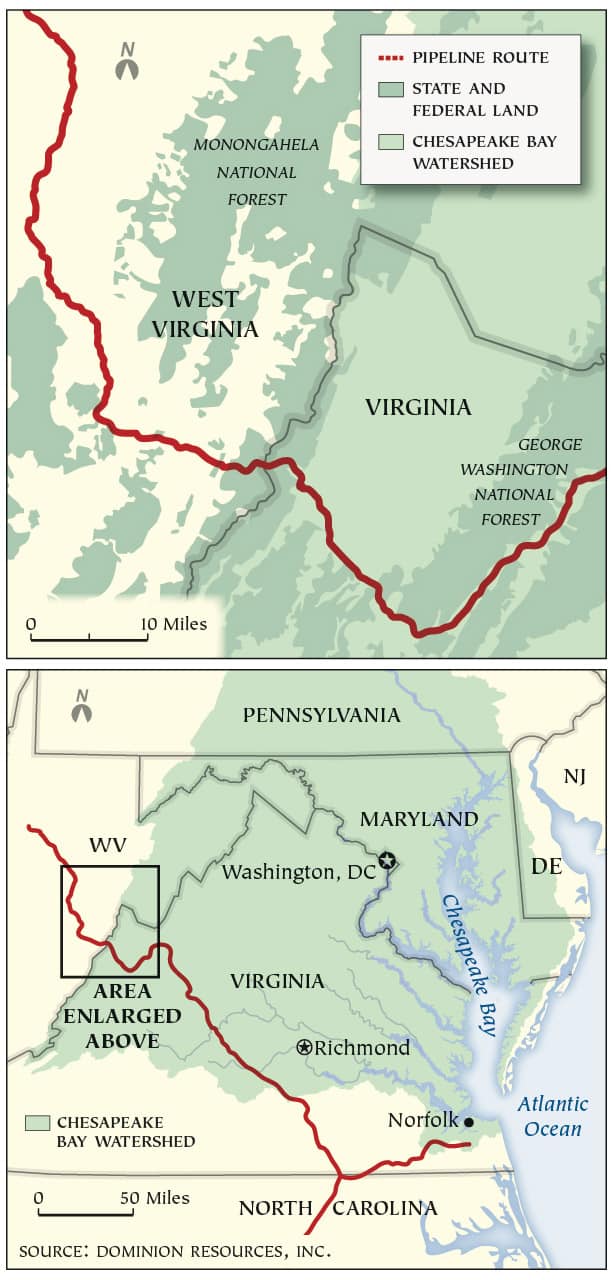By Whitney Pipkin, Bay Journal News Service
A coalition of environmental groups and the Chesapeake Bay Foundation have each appealed a state board’s decision to approve the Atlantic Coast Pipeline, the largest of two controversial natural gas projects planned to cross Virginia, for which Dominion Energy is seeking approval.
The Bay Foundation and the Southern Environmental Law Center, on behalf of more than a dozen environmental groups, each filed their appeals on Friday, the last day they could do so after the State Water Control Board’s Dec. 12 decision.
The board voted 4–3 that day to approve the pipeline after a tense, two-day public meeting in Richmond. Opponents of the pipeline initially claimed the approval as a partial victory, arguing that it was contingent on the state releasing more information about environmental impacts. But they later realized that merely submitting the information — with or without getting the board’s approval of its contents — would satisfy the requirements and allow the project to go forward.
“While the board’s decision postponed the effectiveness of the certification pending completion of important studies, Virginia has treated the decision as final,” a statement from the law center reads. “The groups had to file this challenge now to meet a deadline under state law.”
The law center also filed two other federal lawsuits last week on behalf of several groups, challenging key approvals of the pipeline given by the U.S. Fish and Wildlife Service and the National Park Service.
The organizations contend that, in its current state, even the conditional certification issued to the project “does not adequately assess the impacts of the project on water quality in Virginia sufficiently to meet the requirements of the Clean Water Act.”
In asking the U.S. Court of Appeals for the Fourth Circuit to review the board’s decision, the Bay Foundation stressed the need for the pipeline’s construction to meet “the strictest environmental standards possible” to prevent damage to Virginia waterways.
“We have always maintained that the Water Control Board cannot have reasonable assurance that water quality will be protected unless it evaluates the adequacy of the pipeline company’s plans to prevent construction-caused erosion, dirty stormwater and other impacts,” said Jon Mueller, the foundation’s vice president for litigation.
Before granting the project provisional approval, some of the board’s seven members publicly questioned whether they had enough information to certify that water quality would not be harmed by the construction of the 600-mile pipeline across mountainous terrain and the state’s portion of the Chesapeake Bay watershed. The state Department of Environmental Quality had not yet completed its review of the project’s plans for preventing erosion and managing stormwater in a unique karst geology.
After lengthy deliberations on the larger Atlantic Coast Pipeline, the board ruled in December that its certification would only be final upon completion of additional environmental studies.
This was the second pipeline decision in as many weeks by the state board. Its members voted 5–2 the week before to approve a similar certification for the Mountain Valley Pipeline, a smaller project that snakes across the southwest corner of the state. A coalition of environmental groups filed suit against that project the next day, challenging the board’s ability to conclude that erosion control plans — which the board had not seen because they had not yet been developed — would protect water quality.
Many of those same groups are part of the coalition that the law center represents in its Atlantic Coast Pipeline challenge, including the Sierra Club, Chesapeake Climate Action Network and several regional riverkeeper organizations.
The environmental groups’ suits hinge on the argument that the board should have had all relevant plans and studies before them before being asked to decide on the project’s impact to local water quality.
The DEQ has not said when this information will be delivered to the board or to the public, because it has not imposed any specific deadlines on the pipeline’s backers for submitting it. Beyond completing and submitting these studies, no further action by the board is required for the certification to become effective and the pipeline to begin construction.
“The board may, after review of the report, consider further actions on the certification. The matter is before the board at its discretion without additional public comment on whether further action is warranted,” the statement reads. “When or if the certification will be an agenda item at a future board meeting is unknown at this time.”
Aaron Ruby, a spokesman for Dominion, said he couldn’t comment on the appeals, but said that the company stands behind the board’s decision, which it contends followed the law.
“This has been one of the most heavily scrutinized infrastructure projects in Virginia history,” he said in an email. “We fully expect the Board’s decision to be affirmed by the courts.”
Meanwhile, with approval from the Federal Energy Regulatory Commission, Dominion has begun felling trees and clearing vegetation in upland areas in Virginia and West Virginia. Ruby said the work is being done only on properties where Dominion has reached agreement with landowners, and that work is being held up in wetlands, near water bodies or elsewhere requiring additional federal or state permits.
“We expect to receive all necessary approvals in time to begin construction in the early spring,” he concluded.




